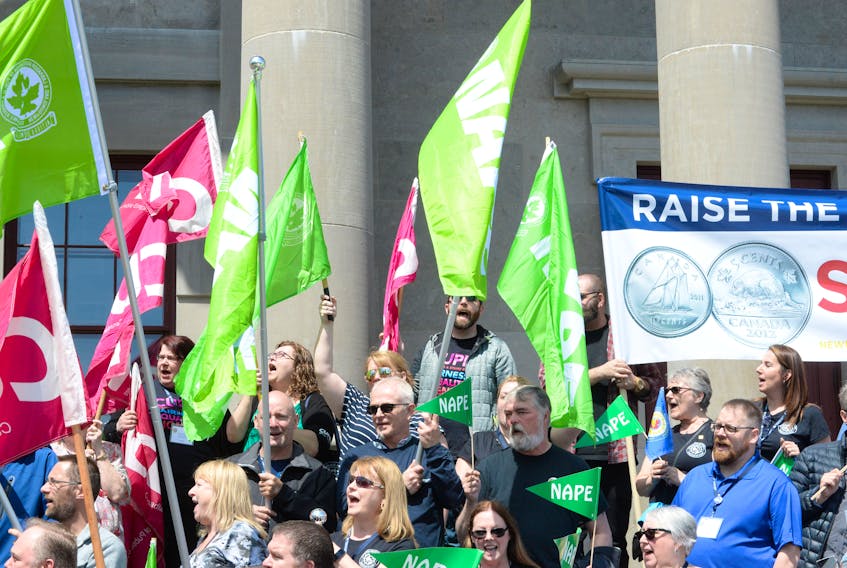You could say Tuesday’s sunny and warm weather upped the stakes for a rally to convince the provincial government to raise the minimum wage for workers in the province to $15 per hour.
A noon-time march and rally by the Newfoundland and Labrador Federation of Labour was energetic, loud and forceful.
About 200 people with flags and shouts and songs of solidarity marched from the Sheraton Hotel, where the federation was holding its annual general meeting, to the Colonial Building, where they stood on the steps of the former house of government. A number of speakers made their case for an increase of the current minimum wage from $11.15 per hour to $15 per hour.
Mary Shortall, president of the Newfoundland and Labrador Federation of Labour, said the labour movement has to dispel the myths being perpetuated by big corporations and business groups that the economy of Newfoundland and Labrador cannot afford a minimum wage of $15 per hour.
Shortall said nowhere else in the country is the gap between the rich and the poor wider than it is in this province.
“If we look at the examples of other places, around the country and around the world, the bigger the gap between the rich and the poor, the harder it is on the economy,” she said. “Even organizations that aren’t unions, the International Monetary Fund, economists from all over the world, say if you have inequality in an economy then it makes it worse. Then as soon as you put money in the hands of workers the economy does better.
“Right now we have a large percentage of workers at minimum wage, a lot of them are women, they work full time. A lot of them work for big employers and they pay a wage that doesn’t allow someone working full time to raise themselves above the poverty line.”
Shortall noted that Alberta, British Columbia and Ontario have already agreed to boost the minimum wage to $15 per hour. The enonomies in those provinces, she said, are already seeing the positive impact.
“Those provinces that have enacted, or are in the process of enacting, the $15 per hour minimum wage are seeing that gap between the rich and poor narrow,” she said. “And just as we said it would, it is better for the economy because of that. Those provinces are experiencing higher economic growth. They have more people working, they are putting more money into those people’s pockets, they are spending it and paying taxes on it, and the economies are doing better. And we need to get that message out to this government and to those naysayers that, in fact, a $15 minimum wage is exactly what this province needs to be doing.”
Speakers at the rally included leaders of a number of unions and labour groups, who said a higher minimum wage would be good for the entire province, bring more people back into the workforce and help bring people out of poverty.
Some speakers challenged the provincial government to make progress toward a higher minimum wage or face a united labour force that will cause the defeat of the government in the next election.
Alyse Stuart of Common Front Newfoundland and Labrador said it’s simple — workers need a living wage.
“No worker deserves to be working and still living in poverty. No worker should have to go home with a sick child and wonder if this lost shift will result in the power being cut,” Stuart said. “No worker should be forced to take on a third job to pay for rent.
“If our government is committed to gender equity, the minimum wage must be increased because 66 per cent of minimum wage earners are women.”
Jerry Earle, president of the Newfoundland and Labrador Association of Public and Private Employees, told the crowd that 32 per cent of workers in the province earn less than $15 per hour.
“One in three have less than a living wage and they work their guts out to survive day by day. Almost six in 10 are women,” Earle said. “Recent years we went through an oil boom in this province where many have seen gains from it. But unfortunately, through that same oil boom, those at the lower end fell further and further behind. There’s a myth we hear from the business community, the St. John’s Board of Trade, the Newfoundland Employers’ Council, that increasing the minimum wage will have a negative impact. Well look at areas where that’s been done. Inequality has been lessened and the economy has improved.”









